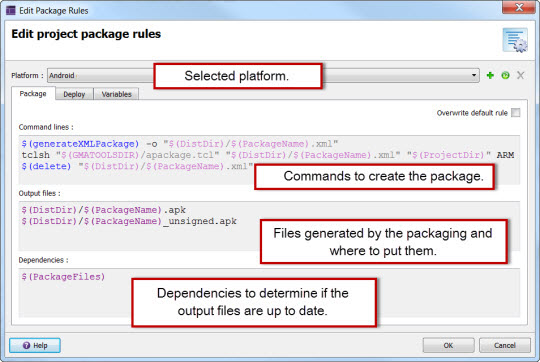Package and deploy rules
A platform includes rules that are used to create and deploy a package file.
- To edit package and deploy rules at a global level, select .
- To edit package and deploy rules at the project level, right-click on a node and select .
This opens the Edit Package Rules dialog, which is described below.
Platform
- Genero Application Server
- Genero Web Application
- Android
- iOS
- iOS Simulator
- Java
- ZIP
For Android™, use the appropriate processor depending on the setup of your Android Virtual Device (AVD) or your physical device hardware. To avoid performance issues, we recommend that you configure your AVD with an x86 processor and Intel® Hardware emulation enabled (HAX). When you create the default AVD using the Genero Studio menu option, the AVD has an x86 processor.
You can add additional platforms (or duplicate an existing one) to create custom package types.
Package rules

Deploy rules
A deploy rule runs a script to deploy the package to a configured application server, a connected device, or an emulator. Figure 2 displays an example of deploy rules for a GAS package.

Commands and variables
These commands and variables are specific to package and deploy rules:
- $(delete)
- Command that deletes the specified file.
- $(DistDir)
- Variable for the path of the destination directory of the current package node.
- $(generateXMLPackage)
- Command that generates an XML file to describe the contents of the package. For
example:
$(generateXMLPackage) -o outputFile.xml - $(PackageFiles)
- Variable for the list of files in the package.
- $(packageId)
- Variable for the package ID.
- $(PackageName)
- Variable for the name of the current package node.
- $(GMATOOLSDIR)
- Path to the tools that support Genero Mobile for Android.
- $(GMITOOLSDIR)
- Path to the tools that support Genero Mobile for iOS.
Other predefined node variables such as $(ProjectDir) and
$(InstallDir) are also valid.
You can add custom variables on the Variables tab of the Edit Package Rules dialog.